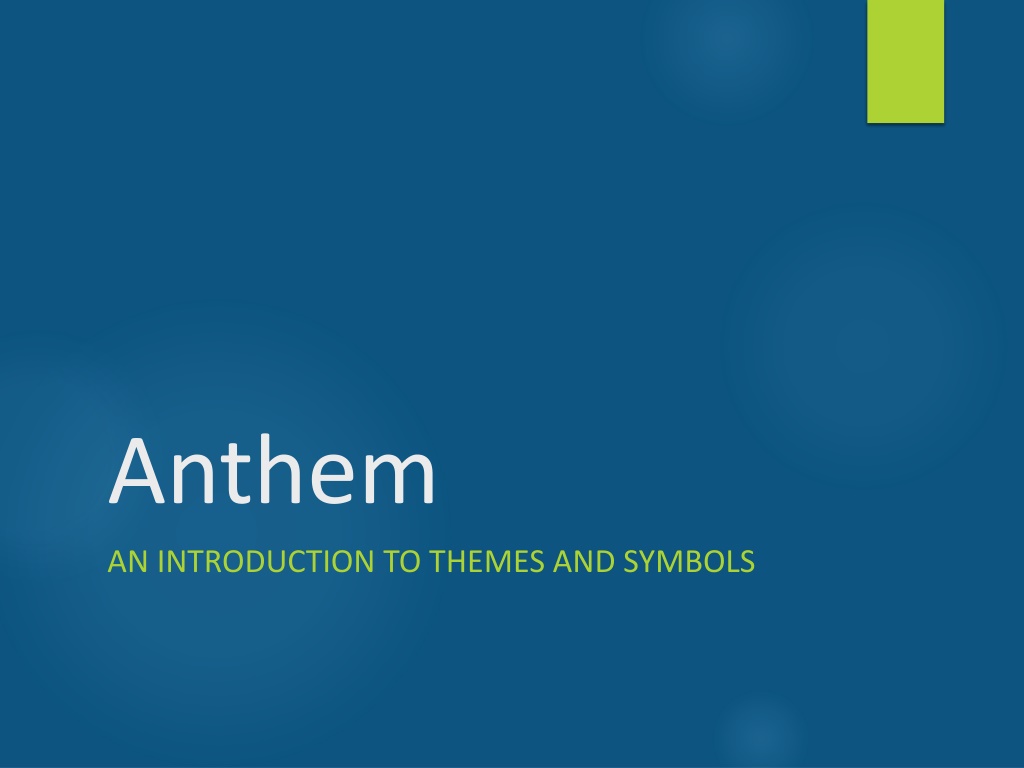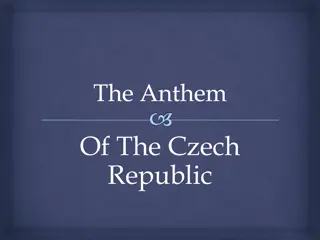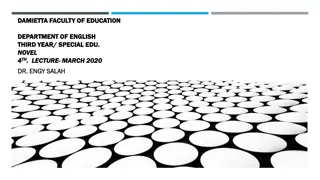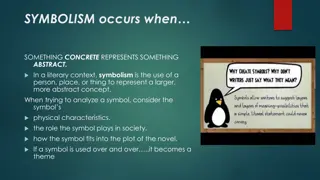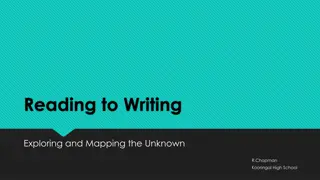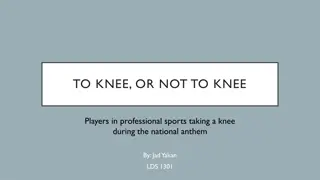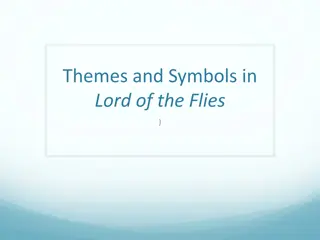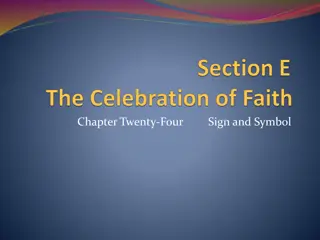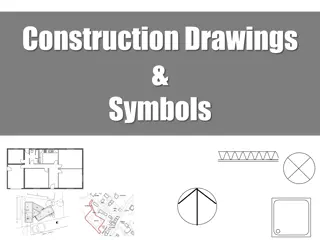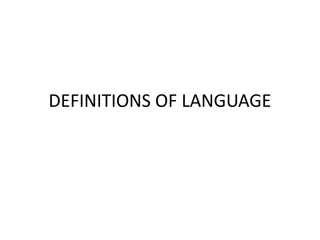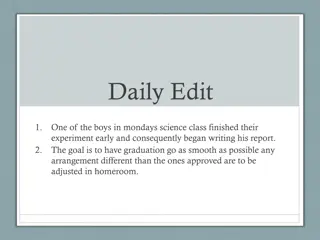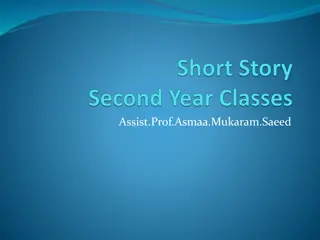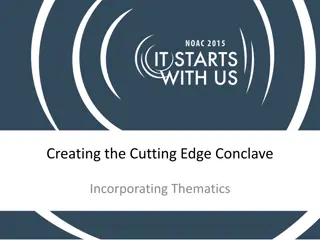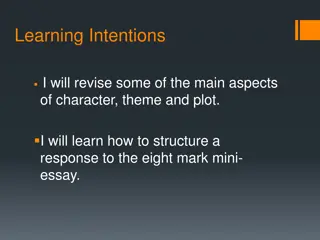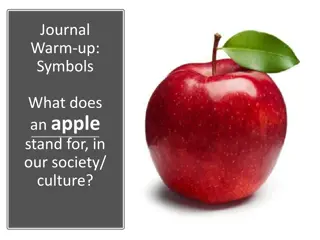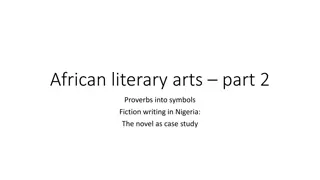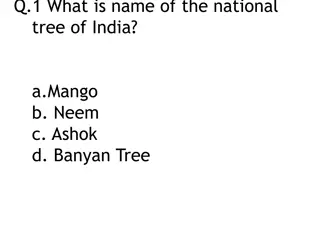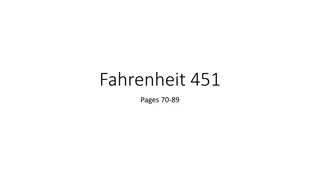Exploring Themes and Symbols in Anthem
In "Anthem," Ayn Rand delves into the themes of individualism and collectivism through the story of Equality 7-2521, a young man who challenges the oppressive society he lives in. The narrative follows his journey towards self-discovery and defiance against a system that suppresses individuality. As Equality 7-2521 embraces his own identity and rejects the collective norms, he symbolizes the triumph of the self over societal constraints.
Download Presentation

Please find below an Image/Link to download the presentation.
The content on the website is provided AS IS for your information and personal use only. It may not be sold, licensed, or shared on other websites without obtaining consent from the author. Download presentation by click this link. If you encounter any issues during the download, it is possible that the publisher has removed the file from their server.
E N D
Presentation Transcript
Anthem AN INTRODUCTION TO THEMES AND SYMBOLS
Overview Equality 7-2521, 21-year-old street sweeper, lives in a society where individuality is condemned. Men are forbidden to think or act for themselves, including having time alone. Technology is severely restricted and not as plentiful or powerful as in the present day. However, Equality 7-2521 sneaks away alone each night to read stolen books and to practice experiments. He wants to be a great thinker and inventor, and hopes his creations will make society better. As you might predict, this all goes terribly wrong, leading Equality 7-2521 to understand new truths about society and himself.
Characters Equality 7-2521: The strong, intelligent, and creative protagonist of Anthem. Despite his exceptional talents and interest in science, Equality 7-2521 s collectivist society forces him to work as a street sweeper and encourages him to feel ashamed of his individualism and self-motivation. The Golden One: A former farm worker whose infatuation with Equality 7-2521 prompts her to follow him into exile. The Golden One is the name she allows him to call her instead of her given name, Liberty 5-3000. Like Equality 7-2521, she is arrogant and self- centered. The Transgressor of the Unspeakable Word: When Equality 7-2521 was ten years old, he watched the Transgressor being burned at the stake for speaking the Unspeakable Word: the anti-collectivist word I. International 4-8818: Equality 7-2521 s friend, International 4-8818 is a humorous, ambitious artist who was forced to abandon his work. The World Council of Scholars: Led by Collective 0-0009, the World Council of Scholars is the group in charge of all scholarly affairs in Equality 7-2521 s collectivist society. The group and its members are meant to illustrate what Rand perceived as the weak, spineless, and inefficient nature of collectivism.
Themes Individualism is the core theme of Anthem. The entire text is essentially a parable designed to illustrate the importance of Ayn Rand's idea of individual will. The plot chronicles Equality 7-2521 s evolution from a brainwashed, faceless drone in a dismal authoritarian state; to a self-sufficient, creative, and powerful man living outside of the system that oppressed him. The key catalyst of Equality 7-2521 s liberation is his self-reliance. Even though his society discourages it, Equality 7-2521 gradually begins to act more and more in his own self- interest, instead of bowing to the arbitrary demands imposed upon him. At first, pursuing his passion for scientific discovery registers to Equality 7-2521 as an evil act, but he learns to feel unashamed of his strength, intelligence, and creativity and slowly begins to develop as an individual. Throughout the novel, Equality 7-2521 refers to himself using the first-person plural, we, highlighting the way that his collectivist society has eliminated the deep-rooted concept of selfhood. As Equality 7-2521 and his individualistic lover, the Golden One, progress through the awakenings of their individual egos, they begin to grasp the concept of the I, and feel torn, torn for some word we could not find. Finally, Equality 7-521 s triumph over collectivist oppression is his realization and embrace of the word
Themes Collectivism is a broad term for any sociopolitical ideology that bases itself on the belief that all humans must depend on one another. The society that Equality 7-2521 is born into is a sinister caricature of collectivist ideals. Noble goals, like equality and fairness, are distorted into justifying ludicrously oppressive living conditions. Presumably to contribute to a collectivist ethos, no member of society can have a conventional name, and everyone is instead assigned a numbered platitude like Freedom or Equality an indication of the words lack of concrete meaning. Before going to bed, men chant, we are nothing. Mankind is all. In the name of fairness, citizens are arbitrarily assigned to jobs unrelated to their skill sets, rather than being allowed to pursue their passions. Equality 7-2521, who is intelligent and vigorous, has ambitions of being allowed to work as a scholar. His hopes are dashed, however, when he is assigned the insulting job of street sweeper. Worst of all, the society s government squashes academic and scientific advancement, afraid of the power it provides the people.
Themes Love and Relationships: The collectivist culture Equality 7-2521 is born into appears designed to eliminate meaningful interpersonal relationships. People are afraid even to speak their minds to one another, for all must agree with all, and they cannot know if their thoughts are the thoughts of all. Deep personal connections are eliminated in the name of equality and impartiality; even the intimate act of sex is reduced to a shamefully impersonal once-a-year trip to the Palace of Mating. The profound love that Equality 7- 2521 finds and shares with the Golden One is a large motivator of his decision to escape from society, and her choice to follow in search of him. Rand criticizes collectivists for turning concepts like freedom and equality into meaningless bromides; she also seems to argue that collectivism diminishes love in much the same way. Upon realizing the power of his own ego, Equality 7-2521 proclaims, I am neither foe nor friend to my brothers, but such as each of them shall deserve of me. And to earn my love, my brothers must do more than to have been born. I do not grant my love without reason, nor to any chance passer-by who may wish to claim it. I honor men with my love. But honor is a thing to be earned. In this way, Rand s individualistic ideal allows for powerful interpersonal connections, rather than the demeaning one-size-fits-all approach that collectivist society demands.
Themes In several senses, power is what allows Equality 7-2521 to assert himself as a unique individual. The most literal way in which power sets the protagonist apart is through his powerful body. Unlike his brethren, who are weak and pitiful in appearance, Equality 7- 2521 is tall and muscular. Equality 7-2521 is also mentally powerful, and his intellect is underutilized by the job of sweet sweeper that he is arbitrarily assigned. Moreover, Equality 7-2521 uses this mental power to harness another sort of power. Through secret study, Equality 7-2521 gains an understanding of electricity and assembles a functional light bulb, which he presents to the World Council of Scholars. The Scholars, however, lack Equality 7-2521 s willingness to embrace this power, and instead fear the new invention. Equality 7-2521 s most empowering characteristic, then even greater than his powers themselves is that he readily takes advantage of his powers, even when his society forbids doing so. The most despicable characters in Anthem are not necessarily the weakest characters, but rather those who, like the Council, work in the name of false ideals to prevent the strong from exercising their individual power.
Symbols At the end of the book, Equality 7-2521 chooses a new name for himself: Prometheus. Prometheus was a Greek Titan who brought fire to humans against the Gods wishes, and was punished with eternal suffering for this transgression. Like the mythical Prometheus, Equality 7-2521 brings a new, life-changing form of technology to mankind, and like Prometheus, Equality 7-2521 must suffer for doing so. Light is used throughout the book to symbolize Equality 7-2521 s individualistic spark. While his society as a whole is dismally conformist and restricted to candlelight, Equality 7-2521 s extraordinary motivation allows him to invent a groundbreaking form of light: the electric light bulb. The World Council of Scholars rejects Equality 7-2521 s invention because the Scholars collectivist sensibilities cannot accommodate this vital individualistic spark. Individuals in Equality 7-2521 s collectivist society are forbidden from thinking of themselves as individuals. The pronoun I is not only forbidden but unknown, and everyone must refer to him- or herself as we in order to ensure that all actions and self- conceptions are collective. Not surprisingly, this is Rand s way of symbolizing the way in which collectivism destroys the individual will, which is, in her opinion, mankind s most sacred and essential attribute.
Close Reading It is a sin to write this. It is a sin to think words no others think and to put them down upon a paper no others are to see. It is base and evil. It is as if we were speaking alone to no ears but our own. And we know well that there is no transgression blacker than to do or think alone. We have broken the laws. The laws say that men may not write unless the Council of Vocations bid them so. May we be forgiven! Equality 7-2521
Close Reading We were born with a curse. It has always driven us to thoughts which are forbidden. It has always given us wishes which men may not wish. We know that we are evil, but there is no will in us and no power to resist it. This is our wonder and our secret fear, that we know and do not resist. Equality 7-2521
Close Reading And questions give us no rest. We know not why our curse makes us seek we know not what, ever and ever. But we cannot resist it. It whispers to us that there are great things on this earth of ours, and that we can know them if we try, and that we must know them. We ask, why must we know, but it has no answer to give us. We must know that we may know. Equality 7-2521
Close Reading International 4-8818 and we are friends. This is an evil thing to say, for it is a transgression, the great Transgression of Preference, to love any among men better than the others, since we must love all men and all men are our friends. So International 4- 8818 and we have never spoken of it. But we know. We know, when we look into each other's eyes. And when we look thus without words, we both know other things also, strange things for which there are no words, and these things frighten us. Equality 7-2521
Close Reading And yet there is no shame in us and no regret. We say to ourselves that we are a wretch and a traitor. But we feel no burden upon our spirit and no fear in our heart. And it seems to us that our spirit is clear as a lake troubled by no eyes save those of the sun. And in our heart -- strange are the ways of evil! -- in our heart there is the first peace we have known in twenty years. Equality 7-2521
